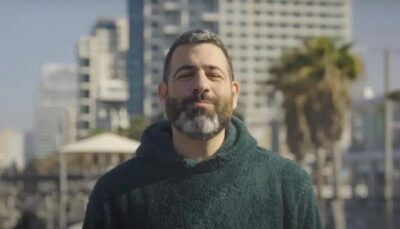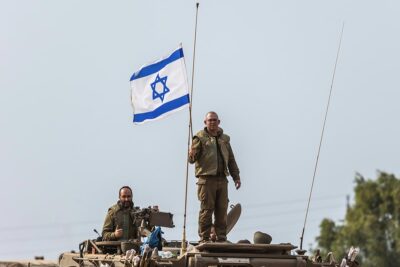Here at The Weekly, we frequently make the case for using nuanced approaches to Jewish and Israel education. We strive to implement this in each Weekly: we present multiple perspectives, give the deeper context, and promote empathy for those who are different from us. But is there ever a time when nuance isn’t the right approach?
It goes without saying that emotions are high for all of us because of the current situation in Israel. Israel is under attack, Arab citizens of Israel are rioting, synagogues have been burnt down, and we’ve all seen images of Jewish mobs reacting violently, to the dismay of Israeli leaders and rabbis across the religious and political spectrum.
Citing the constant barrage of rockets launched by Palestinian terrorists toward Israel, a reader recently asked me: “Is now the time for nuance, or is now the time to tell the world enough is enough, to annihilate Hamas, and to end this once and for all?” Unsurprisingly, another reader on the opposite side had this to say to me: “I don’t need to be told that my opinions are invalid because they aren’t “nuanced.” I’ve been to Palestine and seen the oppression firsthand. Real Jews do not stand for Israelis terrorizing Palestinians. Kindly remove me from your email list.”
Message received. I will not engage in nuance.
The rocket attacks by Palestinian terrorists that indiscriminately target Israeli citizens are terrible and unacceptable. We do not believe in using nuanced approaches when it comes to evaluating the actions of terrorist groups like Hamas and Islamic Jihad.
We also need to understand that, at a time when Israelis are having their cities bombed, it is very hard for Jews in Israel to extend empathy to the Palestinian cause when their leadership is indiscriminately lobbing rockets at civilians. When celebrities and popular politicians are inconceivably flipping the script in some Orwellian way — suggesting it is Hamas who is playing defense while Israel is behaving like a terrorist state — it is simply not reasonable to expect Israelis to view this situation in a nuanced way. Once the fighting stops, and Israelis no longer need to worry about running into bomb shelters or encountering violent riots in their neighborhoods, then we can once again engage them in questions of empathy and nuance.
So, instead of exploring the nuance of the situation, we are focused on the following question: What can we do to ensure Jewish educators and leaders across the religious and denominational spectrums have what they need in order to discuss this situation with their students? We know that our students have a range of opinions, so what can we do to engage them from a mature Zionist framework?
For many educators and organizations, the current display of the Palestinian-Israeli conflict has caught us off guard. Perhaps we did not realize that 51% of Gen Z gets their news from TikTok, and that we as educators have a critical role to play in helping ensure our young people always remain informed about current events, and have a clear sense of how to identify credible content.
Here are a few examples of the many questions we’ve received from educators who are navigating this:
- How do I talk to my students about why Trevor Noah, Gigi Hadid and others are being so one-sided and unsophisticated here?
- What should my message be to our students during a difficult time like this?
- Can students be taught to be strong Zionists and at the same time learn to distinguish between Arab citizens of Israel, Hamas in Gaza, and Palestinians in the West Bank and have empathy for some of them?
These are excellent questions, and we are glad that so many schools are leaning into this topic and engaging their students in the Israeli-Palestinian conflict. At the same time, this situation provides a reminder that literacy in Israeli history and current events is something we should be building in our curricula not just in the moments of crisis, but all year long. Let’s help ensure our students develop this level of literacy so that the next time the Israeli-Palestinian conflict makes international headlines and fills our newsfeeds, our students feel confident, secure and prepared to engage in these difficult conversations.
In the current climate on social media, where many of us are being bombarded with messages, we may feel pressure to go on the defensive. But as Jewish and Israel educators, we believe it is our primary responsibility to ensure our students know the deep, sophisticated and textured context to what is going on, while inspiring them to have a profound sense of connection with our Jewish brothers and sisters in Israel. Here are 10 suggestions for how to engage students and parents during this time:
- Let your students know that there is no moral equivalency between Hamas and Israel. Too many media commentators draw a disturbing parallel between Israel and Hamas, implying that they are morally equivalent and equally to blame for the violence. Let’s make no mistake about it. Hamas is a terrorist group (officially designated this way by the U.S., European Union, Israel, Canada and Japan) that fires rockets indiscriminately at Israeli citizens. Israel is a sovereign country that is defending its citizens through targeted airstrikes aimed at terrorist leaders or military operations. Yossi Klein Halevi reminds us that the Israeli public is fed up by “facile moral comparisons between the IDF, which seeks to minimize civilian casualties, and Hamas, which seeks to maximize Israeli civilian casualties.”
- Start with areyvut (“accountability” or “responsibility”). A guiding principle in Jewish thought is the idea that all Jews are responsible for one another. How can we inspire young Jews who live outside of Israel to care deeply about their extended Jewish family in Lod, Haifa, Jerusalem and Tel Aviv? Many Jewish people in Israel are feeling scared right now. Images of Jews carrying out sifrei Torah from synagogues that were set on fire by Arab rioters in the modern state of Israel remain one of the most painful. As a people, we must first and foremost be there for our people.
- Present the implications about how the Palestinians and Israelis see the current situation. Let’s help our students see the situation from the different perspectives of Palestinians in Gaza and the West Bank, and Arab citizens of Israel (some of whom identify as Palestinian and some of whom do not). We also ought to tell more stories about Jewish and Muslim Arab co-existence now.
- Discuss what it means to have the Israeli Supreme Court issue a decision, and the implications of groups in Israel or the international community accepting (and not accepting) that decision. If the Supreme Court in Israel determines what the law should be in a given instance, what are the implications of the international community not accepting that?
- Welcome a range of perspectives into the conversation. Although many of our students may have a clear answer about who is right and who is wrong, there may also be various perspectives in the room. Let’s make sure all of our students feel comfortable asking questions, and that we explore the more difficult areas with them. Resist the temptation to prove that you are “right.” Some students might be most alarmed by the rare, albeit real, Jewish violence in the streets of Israel; some students might have cousins or friends in the IDF; some students might really want to support Israel, and also be alarmed by painful images of young Palestinians in Gaza who were injured or killed (regardless of the fact that it is Hamas who ought to bear the responsibility for this).
- Challenge assumptions about power and victimhood. On social media, there is a pervasive mentality that victimhood wins the day, so we as a Jewish community want to show we’re the bigger victim. Let’s consider a different approach here. The Israelis do not need to feel ashamed of having relatively more power and strength in the Israeli-Palestinian conflict; to the contrary, Israel ought to be proud of the power it has attained. It ought to be proud of the strong military it has. For almost 2,000 years, the Jewish people were powerless; now, the Jewish people have a degree of power. The question that Israel (along with all sovereign countries) ought to ask is, how should that power be exercised? Should the Jewish state’s primary responsibility be to protect its own citizens? To protect other people’s residents? How does this apply to the current crisis?
- Encourage your students to use social media responsibly. Give your students these key messages: Do not get into a fight on social media if you don’t know the person or if you don’t know the facts of the story. Do not regurgitate talking points. Instead, learn the history, background and story, and then jump in.
- Underscore that the Israelis and Palestinians are real people, not sports teams to root for. As Einat Wilf writes in Maimonides Fund’s new journal Sapir, “Israelis and Palestinians are not sports teams. They are not stand-ins for good and evil, symbols for the struggles in one’s own group much closer to home…Israelis and Palestinians, Jews and Arabs are real people. They are struggling to resolve centuries-long conflicts, which they are slowly doing.”
- Help your students be more critical consumers of information. Also in Sapir, Matti Friedman writes about the need to distinguish between educators and activists. We need to ask ourselves, “Is your source of information an observer whose job it is to explain things, or an activist with a political plan?” The goal of activist organizations “isn’t meant primarily to explain what’s going on, but to induce you to support a particular position. Contradictory information won’t be included.”
- Shift the focus from “Who started it?” to “How did we get here?” as Daniel Gordis reminds us to do. What is the history of Hamas? What is the history of Arab citizens in Israel? What is the story of how the Jewish people built up Israel? Gordis argues, “History matters.”
In light of this, we assembled a list of the videos, podcasts, articles and resources we think would be most helpful to educate your students about the current situation and empower them to discuss it with their peers. Whether you are looking for the best education, or the way to help your students develop into the best advocates for Israel, we think this is the way to go.
Videos:
Can you be Zionist and Progressive?
Does Israel Act as an Apartheid State?
History of the Israeli Palestinian Conflict





